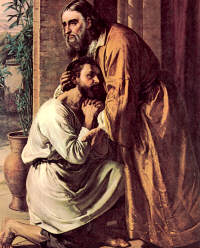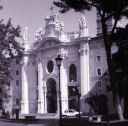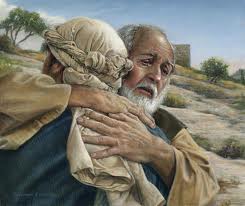
This is a Gospel about a man who had two sons. And both of these sons forsook their father and refused to relive in relationship with him. Although, in our mind, both sons are very different at the level of personality, one outwardly rebellious, and the other outwardly obedient, inwardly, they have a very similar struggle. In effect, neither one of them really wanted a relationship with the Father. Both, in fact, preferred what their father had, to having their Father. Both look more to what their Father could bestow, rather than to their father himself.
In the end, one son repents and finds his way to the heart of the father. Of the 2nd son, we are not so sure, for the story ends before that detail is supplied. Why does the story not end? It does not end, because the story is about you and me, and it is we who must finish the story. And the question we must answer is, What do I really want?….the consolations of God, or the God of all consolation? The gifts of God, or the giver of every good and perfect gift?
Let’s look at this gospel in four stages.
I. Renegade Son–Most of us are quite familiar with the story of the Prodigal Son. Indeed, most of us focus on the first and obviously sinful son, more than the second son. This is interesting, because it would seem that the Lord Jesus has his focus more on the second son. For, the parable is addressed to the scribes and Pharisees who see themselves as obedient. Nevertheless, lets observed three things about this renegade son, also known as the Prodigal Son.
A. Corruption–Here is an angry son, alienated from his father. He wishes to possess what his father has, but he wants nothing to do with his father. In effect he tells his father to drop dead. Yes, in effect he says, “Old man, you’re not dying fast enough. I want my inheritance now… I want to be done with you and cash in now what is coming to me.”
His astonishing effrontery is even more astonishing given where and when it happened. For, we live in times when reverence for parents and elders is tragically lacking. But if our times are extreme, those times in the ancient Middle East where the other extreme. In telling this parable as he does Jesus shocks his listeners who lived in a culture where no son would dream to speak to his father this way. Indeed a son could be killed by his father for such insolence! Even to this day, in many parts of the Middle East, so-called “honor killings” still exist. If a child brings dishonor to the family, it is not unheard of for the father to kill such a child. And while most governments forbid such practices, in many cultures people, while not preferring such extremes, will often look the other way, and governments will seldom prosecute such inter familial killing.
Thus, for Jesus to tell such a parable must have shocked his listeners. Here was a son who did something so bold and daring as to the unthinkable, as insolent as it was insensitive, ungrateful and wicked.
So hateful is this son that he will have to go to a distant land to live. For even if his father does not kill him, his neighbors would surely set upon him and have him stoned for such insolence.
In even more astonishing detail, the father gives him his inheritance and allows him to leave.
Here is Jesus’ description of the patience and mercy of the Father who endures even worse insolence from us, His often ungrateful children; we who demand his gifts, grasped in them with ingratitude, and want what God has, but do not want Him. More of the Father in a moment. But what we begin with the portrait the deep corruption of this renegade son.
B. Consequences–The text says that the renegade son sets off “to a distant country.” For it is always in a distant country that we dwell apart from God. And the consequences of his action are great indeed.
This parable does not make light of sin. The Lord Jesus describes well a man who chooses to live apart from God and in sinful rebellion. The result is that this renegade son lives in anguish and depravity. Once he runs out of money, he has no friends, no family, and no experience of his father.
So low is he, that ends up looking up to pigs! So awful is his state, that he becomes hungry for the disgusting mash that pigs eat. Yes, he is lower than an unclean animal, the most unclean animal that Jews can imagine, a swine.
Let us be clear, sin debases the human person, and if it’s effects are not averted, it orients us increasingly toward depravity. What was once unthinkable, too easily becomes common fair.
St. Augustine wrote of sin’s hold on individuals in the Confessions when he said, For of a forward will, was a lust made; and a lust served, became custom; and custom not resisted, became necessity. By which links, as it were, joined together (whence I called it a chain) a hard bondage held me enthralled. (Conf 8.5.10).
And here is what we find the renegade son locked and the consequences of his sinful choices: debased, debauched, and nearly dead.
C. Conversion–Almost miraculously the text says simply of him, “coming to his senses at last…” Too many, especially today, suffer a darkened intellect due to the debasement of their sin. And it would seem, the no matter how debased, confused, and even enslaved, many people become, they still do not come to their senses, for their senseless minds have become darkened (cf Romans 1:21).
But thanks be to God, the renegade son does come to his senses and he says, I shall arise and go to my father! In saying that he shall arise the Greek text uses the word anistemi, which is the same word used to describe the resurrection of Jesus. His father will later joyfully described him as having been dead, but having come back to life.
St. Paul reminds us, that we were dead in our sins, but God made us alive in Christ (cf Col 2:13). Thanks be to God for the mercy of God and for the conversion that he alone can effect in all of us, his renegade children, who ourselves have been debased, debauched and dead in our sins. The conversion of this renegade son, we pray, is also our conversion, our rising and going back to the Father.
II. Rejoicing Father–the astonishment in this parable is only just beginning, for Jesus goes on to describe a Father so merciful as to be shocking. He ascribes to the father in this parable things that no ancient father would ever do. And as he describes this ancient father, so filled with love and mercy that he casts aside personal dignity to bestow it, we must remember that Jesus is saying, “This is what my Father is like.”
As the parable unfolds we hear that the father sees the son, while he’s still a long way off. This tells us that he was looking for his son, praying for and hoping for his return.
From a human perspective, such mercy is rare, and the average earthly person who is hurt and has had their dignity scorned, is usually resentful and avoidant, saying “Never darken my door again!”
But how shockingly different this father is, lovingly and longingly waiting for the day when his son will appear on the horizon; looking for him day after day.
The text next tells us that, when he saw his son, he ran to meet him; something no ancient noblemen would ever do. For running was a sign of being in flight, or of being a slave on some errand. Further, in order to run, the ancients who wore long garments, had to bare their their legs. And this was considered, for nobility, a disgraceful thing. Only common workers and slaves would bare their legs in order to work.
Thus, here is the portrait of a father willing to debase himself in order to run and greet his returning son. When I take one step, God takes two; nay, he comes running!
The robe and the ring are signs of family belonging, or restoration. This is the full restoration of a young man who was willing to live as a mere slave in his Father’s house. But the Father will have none of it, “You are my son! And my Son you have always been, whatever your sins. They are forgotten. You are my beloved son!”
What kind of Father is this?! No earthly Father would behave this way. This is the Heavenly Father. Jesus is saying, this is what my Father is like!
III. Resentful Son–And now we look to the brother, the other son. His sins are more subtle. Outwardly he follows his father’s rules. He does not sin in overt ways. His sins are more hidden, his struggles more subtle.
Unlike his prodigal brother, it seems he has never openly rejected his father. But inwardly, as we shall see, he is not so different from his prodigal brother.
But like his prodigal brother, he wants his father’s goods, but not really his father. To understand the subtlety of his struggle, let’s look at some of the details of the story. Let us note the following fundamental issues with the resentful son:
1. Distant–It is interesting that the last one who seems to know the existence of the feast, and the reason for it is this reason is this second son. Here is the implicit picture of a son who is far away from his father, who was unaware of the happenings in his father’s life.
Off on some far-flung area of the property, one gets the sense that he is perhaps going about his duties, which he seems to fulfill. But there is also communicated to us a sense of distance.
Did this son not know that the father worried of his brother, and was looking for him each day? It seems not! But even the lowly slaves in the household are drawn into the preparations in celebration of this great feast at the return of the renegade son. It seems that he is the only one in the whole area who knows nothing of this party, and more importantly, of his father’s joy in the return of his brother.
Yes, the resentful son is distant, a thousand miles away from the heart of his father.
2. Disaffected–When this resentful son discovers the feast, and the reason for it, he is sullen, angry, and resentful. He is disaffected. He stays outside of the feast, and refuses to enter it.
So bitter is his resentment that the word reaches his father in the feast who will soon emerge to plead with him. Yes, here is a bitter angry and disaffected son.
But dear reader, do not spurn or scorn him, for too easily we are him. Too easily, do we die the death of a thousand cuts when some sinner finds mercy, so quickly are we envious when someone other than ourselves is blessed. Yes, so easily we die a thousand times over!
3. Disconsolate–the father emerges from the feast to plead with his son! Again, this is unheard of in the ancient world! Every ancient father would command his son to enter the feast and expect those commands to be immediately followed.
But this father is different, for he is the heavenly Father, a Father rooted in love more than prerogatives, and privileges. He has shown already his love for his renegade son. And now he demonstrates his love for his resentful son.
The fact is, he loves both his sons. Yes, he loves you, even as he loves me.
Tragically, the resentful son is unmoved by this love. He is disconsolate, he must be confronted in his resentful anger.
4. Disrespectful–And now we see the ugly side of the apparently obedient son. He does not really love or respect his father; neither does he really know him. He disrespects him to his face. He speaks of him as a slave master saying, “I have slaved for you… I have never disobeyed any one of your orders.
Orders?!?! I have slaved for you?? Where is his love for his father? He does not see himself as a son, but as an unwilling slave, one who follows orders, merely because he has to. In effect he calls his father, to his face, a slave master, a despot.
Further, he accuses him of injustice. Somehow, he sees the mercy for the renegade son as a lack of due mercy toward himself. He considers his father unreasonable, unjust, even despicable. How dare his father show mercy to someone that he, the “obedient” son, does not think deserves it!
Calling his father an unjust slave owner and taskmaster, he disrespects him to his face. But the father, as we shall see stays in the conversation, pleading with his son to reconsider.
5. Disordered. Among the son’s complaints is that his father never even gave him a kid go to celebrate with his friends. But pay very close attention here: the goal in life is not to celebrate with my friends, the goal in life is to celebrate with the heavenly Father.
Note how similar the resentful son is to the once renegade son. At one point, the renegade son saw his father only in terms of what his father could give him, his father was only valuable in terms of the “stuff” he could get from his father.
But for all his obedience, this second “obedient” son, this resentful son, has the same problem. He seems to value only what his father can give him. It is not his father he really loves, or knows. It is the inheritance, it is the “stuff” that really concerns him. It is not really his father he wants, or knows, or loves. It is only what his father can give him.
In this, the resentful son is disordered. He misses the whole point, which is not the things of the father, but the relationship with the father. This is the point, this is the goal in life, to live with it forever with the Father in a relationship of love.
Be very careful, before you condemn this resentful son. For, too easily he is us. It is so easy for us to want the good things of God, but not God himself. We want God’s blessings, his benefits, but not His beloved self. We want the gifts, but not the God who is the giver every good and perfect gift.
Yes, the disorder of this resentful son is too easily our disorder. There is something about our flesh that wants God to rain down blessings, but having received them, we want to run and keep our distance from any true relationship with God. For relationships are complicated and dynamic. Our flesh prefers trinkets, prefers to receive gifts on our own terms. Our flesh says give me the priceless pearls, but begone with the powerful person who gives them.
IV. Response. The Father, is outside pleading with his resentful son to enter the feast. And then, abruptly, Jesus ends the parable. Yes, the story ends! Does the resentful son enter the party or not?! Why is the story left unfinished?
Simply put, because you and I have to finish the story. For we are so easily the resentful son.
Right now, that heavenly Father is pleading with you and me to enter the feast. Too easily we can brood and say, we have our reasons for not wanting to go into the feast. After all, that renegade son is in there, and my enemy is in there. If heaven involves meeting our enemy and celebrating with him, too easily our flesh says, “I’ll have nothing to do with it!”
And here’s the great drama, will we enter the real heaven? For the real heaven is not merely a heaven of our own making, a heaven of our own parameters. Heaven is not a “members only” place.
Am I willing to enter on God’s terms? Or will I resentfully stand outside, demanding heaven is on my terms? Further, do I see heaven as being with the Father, or is heaven merely having the “stuff” I like?
The heart of heaven is to be with the Father, to be with the Trinity. The danger with so many, even the religiously observant, is to be the resentful son. Meanwhile, the Father is pleading, pleading for us to enter the feast, pleading for us to set aside our prejudices, and our notions of exclusivity.
To the resentful son who said, “this son of yours…,” the father says, “your brother,” yes, your brother was lost and is found, was dead, and has come back to life.”
The Father is pleading for us to enter the feast, not some made-up feast where we ourselves simply choose the attendees, but the real, and actual feast of heaven, where some surprising people may be in attendance.
Will you enter the feast? The Father is pleading!, Saying in effect, “come in, before it’s finally time to rise and closed the door.” How we’ll answer him what is your response.
This parable is unfinished, you must finish it, I must finish it. What is your response to the Father’s pleading? Answer him!











